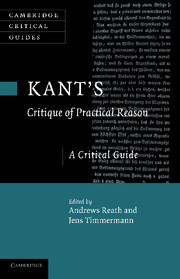Book contents
- Frontmatter
- Contents
- Preface
- List of contributors
- Translations and abbreviations
- Introduction
- 1 The origin and aim of Kant's Critique of Practical Reason
- 2 Formal principles and the form of a law
- 3 Moral consciousness and the ‘fact of reason’
- 4 Reversal or retreat? Kant's deductions of freedom and morality
- 5 The Triebfeder of pure practical reason
- 6 Two conceptions of compatibilism in the Critical Elucidation
- 7 The Antinomy of Practical Reason: reason, the unconditioned and the highest good
- 8 The primacy of practical reason and the idea of a practical postulate
- 9 The meaning of the Critique of Practical Reason for moral beings: the Doctrine of Method of Pure Practical Reason
- Bibliography
- Index
Introduction
Published online by Cambridge University Press: 06 August 2010
- Frontmatter
- Contents
- Preface
- List of contributors
- Translations and abbreviations
- Introduction
- 1 The origin and aim of Kant's Critique of Practical Reason
- 2 Formal principles and the form of a law
- 3 Moral consciousness and the ‘fact of reason’
- 4 Reversal or retreat? Kant's deductions of freedom and morality
- 5 The Triebfeder of pure practical reason
- 6 Two conceptions of compatibilism in the Critical Elucidation
- 7 The Antinomy of Practical Reason: reason, the unconditioned and the highest good
- 8 The primacy of practical reason and the idea of a practical postulate
- 9 The meaning of the Critique of Practical Reason for moral beings: the Doctrine of Method of Pure Practical Reason
- Bibliography
- Index
Summary
The Critique of Practical Reason is Kant's second foundational work in moral theory after the Groundwork of the Metaphysics of Morals. Its stated aim is ‘merely to show that there is pure practical reason’ (CpV 5:3). That is, it attempts to show that reason by itself yields an objective principle of conduct that applies independently of individuals' preferences and empirically given aims – a principle that Kant identifies with the fundamental principle of morality – and thus to show that practical reasoning is not limited to instrumental and prudential reasoning as the empiricist tradition holds. To accomplish this aim, Kant tries to document the origin of the fundamental principle that underwrites common moral thought in reason (in ‘pure practical reason’) and to establish its overriding authority.
A ‘critique’ is a critical examination of a cognitive faculty that sets out its powers and limits, and in particular establishes the legitimacy of any a priori concepts and principles that structure the relevant domain of cognitive activity. Kant's views about the need for and proper focus of a critique of practical reason changed over time. When he published the Groundwork in 1785, he intended it to take the place of a critique of pure practical reason. He writes that although ‘there is really no other foundation for a metaphysics of morals than a critique of pure practical reason, just as that of metaphysics is the critique of pure speculative reason’, the need for the former is less urgent.
- Type
- Chapter
- Information
- Kant's 'Critique of Practical Reason'A Critical Guide, pp. 1 - 10Publisher: Cambridge University PressPrint publication year: 2010

